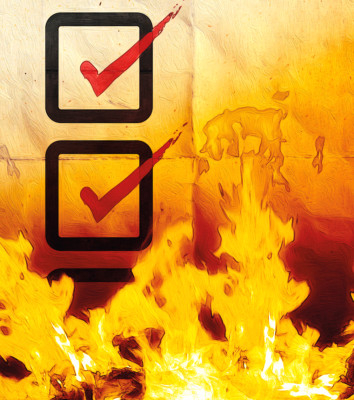A pattern is emerging in United States President Donald Trump’s foreign policy: Time after time, he’s doing what he promised to do.
Week before last, Trump announced that the US was formally recognising occupied Jerusalem as Israel’s capital and moving its embassy there, even though some of his aides warned that the move could derail peace negotiations. “I fulfilled my campaign promise,” the president boasted on Twitter. “Others didn’t.”
Before that, Trump refused to certify that Iran is complying with its nuclear deal and renewed his threat to scrap the agreement.
Before that, he pulled the US out of the Paris climate agreement, despite US Secretary of State Rex Tillerson’s recommendation to stay in.
And week before last, at a campaign-style rally in Florida, Trump renewed his complaint that Nato members aren’t paying their fair share for defence. He questioned whether America should defend them in a war with Russia. “It helps them a hell of a lot more than it helps us, OK?” he said. “So we’ll have a nation that doesn’t pay. Then their nation gets frisky with whoever — Russia. So ... we end up in World War III for somebody that doesn’t even pay?”
In Washington, Trump’s aides have tried to polish his rough edges. They have implored him to stick to official texts when he talks about foreign policy. They have assured allies that his positions aren’t as disruptive as they sound. Their message often boils down to: Watch what we do, not what he says.
From time to time, they’ve even succeeded in restraining the president from acting on his initial impulses.
Trump wanted to scrap the Iran deal immediately; instead, he’s agreed to give Congress a chance to impose new sanctions first. (Congress has not complied.) They persuaded him, after several tries, to reaffirm the US defence commitment to Nato — even though he keeps backsliding. They persuaded him to give sanctions a chance to nudge North Korea towards halting its nuclear weapons programme, even though he says diplomacy is a waste of time. They convinced him to sign a bill from Congress imposing sanctions on Russia for interfering in the 2016 election — even though he still refuses to admit it happened.
However, once the president is freed from the constraints of the White House, the old Trump returns: Combative, blustery and resentful of the idea that the United States has a special obligation to lead the world.
“My job is not to be president of the world,” he said in Florida. “My job is to be president of the United States of America.”
It’s that “America First” impulse that worries the foreign policy establishment most. They believe Trump is eroding the alliances the US has built after the Second World War, with a corresponding erosion of American influence.
“I’m scared,” Madeleine Albright, who had served as US secretary of state under president Bill Clinton, said at an Aspen Strategy Group conference last week. “I often called the United States the indispensable nation. We are becoming the dispensable nation. Others are deciding they can do without us.”
‘An alternative international order’
“There is a risk,” said Stephen Hadley, a Republican who served as national security adviser under former president George W. Bush. “The risk is that China, Russia and others will form an alternative international order based on international principles.”
That’s not the only reason the president’s stubborn fidelity to his campaign promises is chilling. If Trump sticks to the unalloyed positions he brought to the White House, we’re in for a series of crises: A military showdown with North Korea, if Kim Jong-un continues his nuclear missile programme; a series of trade wars, beginning with Canada and Mexico if they continue to resist new concessions in Nafta.
Trump can claim some successes in his first year. The war against Daesh (so called Islamic State of Iraq and the Levant) is coming to a close (although there’s plenty of post-war work to do). He has pushed Nato countries to increase their defence spending (just not enough to make him happy).
He’s on a first-name basis with Russian President Vladimir Putin, Chinese President Xi Jinping and German Chancellor Angela Merkel. But at the age of 71, he hasn’t changed much — and, judging from his speech in Florida, he hasn’t learned much, either.
When he ran for president, he had promised, in effect, to destabilise the international order. And he’s delivering.
— Los Angeles Times
Doyle McManus is a senior columnist, journalist and broadcaster.










